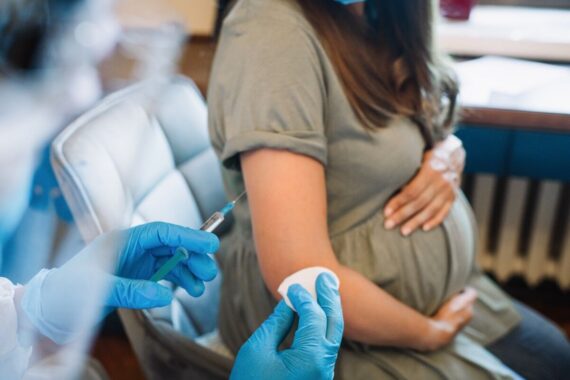New RSV vaccination programme could cut GP consultations by 35,000

The new RSV vaccination programme due to start in September could prevent 20,000 GP consultations for poorly babies, public health experts predict.
The analysis by the UKHSA and London School of Hygiene and Tropical Medicine also suggests the vaccine could prevent 5,000 hospitalisations in infants in England and Wales.
The analysis which assumes 60% uptake of the maternal vaccine suggests a ‘substantial reduction’ in the burden of RSV disease in the infant population.
The UK Health Security Agency and Joint Committee for Vaccination and Immunisation (JCVI) noted the maternal RSV immunisation programme could lead to 15,000 fewer emergency department visits and prevent 200 infants being admitted to intensive care.
Modelling by the same team – using enhanced surveillance of older adult admissions – suggests that the first season of the older adult’s catch-up programme could also prevent around 15,000 GP visits, 2,500 hospital admissions, and 60,000 RSV illnesses.
In July, the UK announced it would become the first country in the world to have a national respiratory syncytial virus (RSV) immunisation programme that uses the same vaccine to protect newborns and older people.
Contractual guidance on the vaccination programme for GPs was published on the 9 August which sets out that all practices will be required to offer it.
The vaccine to be used for the campaign is the bivalent recombinant vaccine developed by Pfizer called Abrysvo, which was licensed by the Medicines and Healthcare products Regulatory Agency (MHRA) in November last year.
From 1 September practices will be expected to proactively call and recall adults aged 75 to 79 years as well as offering and providing the vaccine to all eligible women from 28 weeks of pregnancy.
‘Where a practice is aware of a patient’s pregnancy and there is no RSV vaccination in their medical record, it would be clinical best practice to check with the patient whether they have been vaccinated and offer this vaccination given the importance of protection to the infant,’ the guidance states.
Professor Dame Jenny Harries, UKHSA chief executive, said: ‘These two new RSV vaccine programmes – one for pregnant women and another for older adults as they turn 75 – offer huge opportunities to prevent severe illness in those most vulnerable to RSV, helping to protect lives as well as ease NHS winter pressures.
‘UKHSA has provided critical scientific information to evidence the benefits of a national RSV immunisation programme and so the rollout of the vaccine is a truly positive moment for the public’s health. I urge all those eligible, to take up the offer when the programmes begin in September.’
Andrew Gwynne, minister for public health and prevention, said: ‘Sadly my grandson caught RSV, just days after he was born.
‘It led to weeks in intensive care and persistent, long-lasting health issues. I wouldn’t wish that on any family. This new vaccine programme offers us an opportunity to prevent similar trauma, helping stop thousands of hospitalisations while saving precious lives.’
Steve Russell, NHS national director for vaccinations and screening, said: ‘The NHS will be rolling out the vaccine from 1 September and with RSV infecting around 90% of children in their first two years of life, we strongly encourage pregnant women who are 28 weeks pregnant or more to speak to their maternity team or GP about getting vaccinated – it could save your child’s life.
‘While those aged 75 to 79 should come forward as soon as they are invited by their GP.’
Visit Pulse Reference for details on 140 symptoms, including easily searchable symptoms and categories, offering you a free platform to check symptoms and receive potential diagnoses during consultations.
Related Articles
READERS' COMMENTS [1]
Please note, only GPs are permitted to add comments to articles










There was an informative and interesting lettering the BMJ re this vaccine in pregnancy due to its side effect risks of increased premature births(and associated morbidity and deaths) (one similar vaccine was withdrawn due to these risks) The letter suggested waiting till 36 weeks before having it and if the mother did deliver offer vaccination offering the infant palivizumab. A horrible disease in young infants and will be great to rescue it. The figures quoted on GP workload mean one less consultation per year per GP based on over 50,000 GP.s